|
|
|
Sort Order |
|
|
|
Items / Page
|
|
|
|
|
|
|
| Srl | Item |
| 1 |
ID:
151647
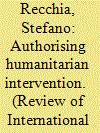

|
|
|
|
|
| Summary/Abstract |
Even scholars who support multilateralism in principle frequently question the value of securing approval from existing multilateral bodies for humanitarian intervention. The United Nations (UN) and regional organisations such as NATO, the argument goes, are far from democratic; furthermore, multilateralism is often a recipe for doing nothing; therefore, unauthorised intervention should be permissible in circumstances of ‘humanitarian necessity’. This article maintains that although today’s multilateral organisations and related procedures for authorising armed intervention may be suboptimal, they have significant output legitimacy. First, existing authorisation procedures reduce the risk of destabilising conflict spirals among powerful states. Second, they diminish the likelihood that humanitarianism will be used as a pretext. Third, they reduce epistemic problems concerning the identification of a just cause for intervention and thus the risk of accidental abuse. Fourth, they minimise the ‘moral hazard’ of humanitarian intervention. Finally, compliance with multilateral procedures is increasingly required for successful peacebuilding. This leads me to conclude that humanitarian warfare should always be authorised by the UN or regional multilateral organisations.
|
|
|
|
|
|
|
|
|
|
|
|
|
|
|
|
| 2 |
ID:
182636
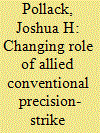

|
|
|
|
|
| Summary/Abstract |
Multiple non-nuclear-armed states in alliances with nuclear-armed states are in the process of acquiring long-range, conventionally armed precision-strike weapons, some of which have potential to contribute to attacks on enemy nuclear forces. This change in the distribution of advanced military technologies has the unintended consequence of giving these non-nuclear-armed states an active role in strategic stability. We provide a theoretical framework for understanding the newly emerging pathways to nuclear use that result. We also investigate perceptions of the role of precision-strike capabilities in six non-nuclear-armed states at various stages in the process of developing these capabilities.
|
|
|
|
|
|
|
|
|
|
|
|
|
|
|
|
| 3 |
ID:
190833
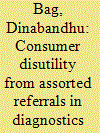

|
|
|
|
|
| Summary/Abstract |
This article highlights the moral hazard problem in credence goods offered in the market as referral services. Credence goods are purchased with trust that is not observed. This examines if a penalty framework by authorities or transparency in tariff can offset moral hazard costs. A simple service unit cost model and its application to consumer expenditure data suggests that expected disutility to consumers are minimized in the penalty framework. The findings differ in the way consumers respond to transparency in tariffs, and could continue to bear moral hazard cost, as long as such units are unregistered in nature.
|
|
|
|
|
|
|
|
|
|
|
|
|
|
|
|
| 4 |
ID:
124138
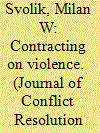

|
|
|
|
|
| Publication |
2013.
|
| Summary/Abstract |
Why does the military intervene in the politics of some countries but remain under firm civilian control in others? The paper argues that the origins of military intervention in politics lie in a fundamental moral hazard problem associated with authoritarian repression. Dictators must deter those who are excluded from power from challenging them. When underlying, polity-wide conflict results in threats to the regime that take the particular form of mass, organized, and potentially violent opposition, the military is the only force capable of defeating them. The military exploits this pivotal position by demanding greater institutional autonomy as well as a say in policy, and it threatens to intervene if the civilian leadership departs from a subsequent compromise on these issues. A game-theoretic analysis of such contracting on violence implies that the likelihood of military intervention in politics should be greatest at intermediate levels of mass threats. Original, large-N data on military intervention support these claims.
|
|
|
|
|
|
|
|
|
|
|
|
|
|
|
|
| 5 |
ID:
165433
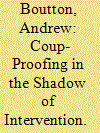

|
|
|
|
|
| Summary/Abstract |
How does the anticipation of external support affect dictators’ domestic political behavior? We lack a convincing explanation for why authoritarian leaders often attempt to consolidate power in ways that heighten the risk of violence and endanger the regime. Adapting the moral hazard framework from the alliance literature, I argue that the anticipation of military support from allies lowers the potential costs of regime purges. This reduces the incentives for dictators to govern inclusively, encouraging more aggressive coup-proofing actions and generating a higher risk of retaliatory violence. Using new data on elite purges in authoritarian regimes, I find that defensive alliances increase the propensity of dictators to aggressively consolidate power. In addition, these types of alliances lead to purges of more powerful elites, which, in turn, increase the likelihood of post-purge large-scale violence. By contrast, forms of external support that entail less commitment by the patron do not have these effects. I provide an overview of the origins of the 1998–1999 civil war in Guinea-Bissau to complement the novel empirical results and to illustrate the causal logic of the argument in the context of West African alliance politics.
|
|
|
|
|
|
|
|
|
|
|
|
|
|
|
|
| 6 |
ID:
183145
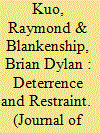

|
|
|
|
|
| Summary/Abstract |
Multinational military exercises are among the most notable demonstrations of military cooperation and intent. On average, one is initiated every 8.9 days. But it has often been argued that joint military exercises (JMEs) increase the risk of war. Using a relational contracting approach, we claim that formal military alliances mediate the effect of JMEs. Exercises and alliances serve complementary functions: The former allows targeted responses to military provocations by adversaries, while the latter provides institutional constraints on partners and establishes a partnership’s overall strategic limitations. In combination, alliances dampen the conflict escalation effects of exercises, deterring adversaries while simultaneously restraining partners. We test this theory using a two-stage model on directed dyadic data of JMEs from 1973 through 2003. We find that JMEs in general do not escalate conflict, and that JMEs conducted with allies in particular reduce the probability of conflict escalation.
|
|
|
|
|
|
|
|
|
|
|
|
|
|
|
|
| 7 |
ID:
182789


|
|
|
|
|
| Summary/Abstract |
We test how crop insurance participation affects the intensity of pesticide use in China using data on staple crop production from eight provinces. Our preferred specification instruments farmers' decisions of participation in insurance by village-level intensities of promotional activities and controls for province fixed effects. We find crop insurance participation significantly reduces pesticide use intensity. The reduction effect is greater for smaller plots, older farmers, and farmers who are more risk averse.
|
|
|
|
|
|
|
|
|
|
|
|
|
|
|
|
| 8 |
ID:
091955
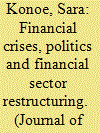

|
|
|
|
|
| Publication |
2009.
|
| Summary/Abstract |
This article analyzes and compares the financial sector restructuring process after the financial crises in Japan and the United States. As these financial crises deepened, countries shifted their policies away from postponing financial sector restructuring toward more thorough reforms. The impacts of different political structures are examined through the Small-N Case Study method. Cases include: the bursting of the financial bubble in the 1990s in Japan and the Savings and Loan crisis in the 1980s in the USA, both of which are analyzed through a review of academic literature, journalistic writings, and statistical data from the World Wide Web.
|
|
|
|
|
|
|
|
|
|
|
|
|
|
|
|
| 9 |
ID:
192714
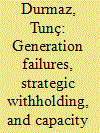

|
|
|
|
|
| Summary/Abstract |
Since the deregulation of significant parts of electricity markets in many countries worldwide, a generally pronounced matter is that firms strategically lower their generating capacity to raise electricity prices. This paper investigates whether strategic capacity withholding exists in the form of generation failures in the Turkish day-ahead market and whether the capacity remuneration mechanism contributes to the failure durations. The empirical results show strong support for strategic capacity withholding in the Turkish market, and the capacity mechanism adds to the duration of these failures. To the best of our knowledge, this is the first study to investigate capacity withholding considering centrally determined capacity prices and to focus on failure durations and the potential amount of power generation losses they cause. Our analysis conveys core messages for policymakers. A random verification mechanism may be implemented to verify that the failures are purely technical and apply penalties for nonperformance. Second, the Turkish capacity mechanism needs to be restructured to make it more compatible with performance incentives. Our analysis, while focused on the Turkish market, provides insights into the prevalent challenges and potential solutions tied to strategic capacity withholding in deregulated electricity markets globally, notably those employing capacity remuneration mechanisms.
|
|
|
|
|
|
|
|
|
|
|
|
|
|
|
|
| 10 |
ID:
192877
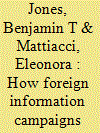

|
|
|
|
|
| Summary/Abstract |
Governments involved in civil wars often seek to shape foreign perceptions of the conflict and of the government’s role in the conflict. To this end, for example, many such governments have engaged in public diplomacy campaigns (PDCs) in the United States since the end of the Cold War. Specifically, these governments have hired US public relations (PR) and lobbying firms to present favorable narratives of themselves and their role in the conflict. Through PDCs, governments seek to shape US public pronouncements about the governments and the conflict itself. Are PDCs effective tools to reach this goal? We argue that the effect of PDCs is divergent. PDCs help mobilize both supporters and opponents of the sponsoring governments. In so doing, PDCs increase both positive and negative public statements from US officials toward the civil war government. We compile data on PDCs in the United States since the end of the Cold War. Our results have implications for research on foreign influence in foreign policy, combatants’ moral hazard, and international norms about combatant behavior. Moreover, in order to gauge the influence of foreign actors on domestic narratives of civil wars, it is crucial to consider how such foreign actors can indirectly shape the discourse around conflict by mobilizing domestic factions.
|
|
|
|
|
|
|
|
|
|
|
|
|
|
|
|
| 11 |
ID:
128984


|
|
|
|
|
| Publication |
2014.
|
| Summary/Abstract |
Do military alliances foster aggressive behavior in allies to the point of undermining the security goal of the alliance? Like others, we find that alliance commitments may cause moral hazard because allies do not fully internalize the costs of actions that can lead to war. But unlike others, we show that the effect of moral hazard can improve security. Moral hazard can be the driving force behind generating deterrence and avoiding costly conflict. Aggressors may refrain from initiating crises if their target enjoys additional resources from its ally and so is more willing to fight back. So rather than incurring costs, moral hazard may be the very key to deterring potential aggressors and minimizing the risk of conflict. This behavior allows alliance partners to capture a "deterrence surplus," which are the gains from avoiding conflict.
|
|
|
|
|
|
|
|
|
|
|
|
|
|
|
|
| 12 |
ID:
123013


|
|
|
|
|
| Publication |
2013.
|
| Summary/Abstract |
The cabinet is a central actor in policy making in parliamentary systems. Yet, relatively little is known about how coalition cabinets operate. The delegation of decision-making authority to ministers invites policy drift, which threatens the cohesiveness of the cabinet's policy programme. Cabinets employ a variety of methods to contain policy drift. The writing of coalition agreements is among the major tools, but there are others, including limiting ministerial autonomy and the use of junior ministers to shadow ministers. The present study demonstrates that coalition agreements are written to contain policy drift and that it is directly related to the degree of hierarchy in the cabinet. It studies the factors that affect the likelihood of a coalition agreement being written and how extensive they are, if written. Among these are the ideological diversity found in the cabinet, the use of alternative methods for controlling ministers and the complexity of the bargaining situation.
|
|
|
|
|
|
|
|
|
|
|
|
|
|
|
|
| 13 |
ID:
081551
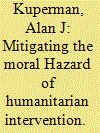

|
|
|
|
|
| Publication |
2008.
|
| Summary/Abstract |
The emerging norm of humanitarian intervention, or the Responsibility to Protect, resembles a social insurance policy to protect ethnic groups against genocide and ethnic cleansing. If a state perpetrates such genocidal violence, the norm calls for a payout-up to and including military intervention-to protect the group and ensure its security, often by enhancing its autonomy from the state. Unfortunately, this leads to a common pathology of insurance-moral hazard-whereby the expected payout for a loss unintentionally encourages excessively risky or fraudulent behavior. Thus, some militants may rebel despite the risk of provoking state retaliation, because they expect any resulting atrocities to attract intervention that facilitates their rebellion. This article summarizes recently published evidence for this dynamic, explores the feasibility of adapting insurance strategies that mitigate moral hazard, and then proposes a reform of humanitarian intervention based on the most feasible of these adapted strategies.
|
|
|
|
|
|
|
|
|
|
|
|
|
|
|
|
| 14 |
ID:
168063
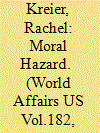

|
|
|
|
|
| Summary/Abstract |
In health care markets, moral hazard is conventionally viewed as a demand-side phenomenon in which insurance causes patients to use more care because it reduces the price they have to pay for care. However, demand-side moral hazard cannot explain why U.S. per capita health care costs are much higher than those of countries with universal coverage and lower out-of-pocket charges. Instead, blame rests with a phenomenon that may be called supply-side moral hazard, which occurs when third-party payment removes the constraints the demand curve would otherwise exert over the prices providers charge, and the quantity of expensive services they can sell. Public institutions are better positioned than private entities to address supply-side moral hazard. This helps explain why the other wealthy democracies—both those with single-payer systems, like Canada, and those with multipayer systems and all-payer procedures for setting provider rates, like Germany and Switzerland—spend much less per capita than the United States. Although managed care achieved some success in controlling U.S. provider prices in the 1990s, in the longer term, it motivated increasing market concentration among providers, which vitiated cost control. Furthermore, managed care exacerbates inequity and complexity, problems that public price regulation avoids.
|
|
|
|
|
|
|
|
|
|
|
|
|
|
|
|
| 15 |
ID:
165431


|
|
|
|
|
| Summary/Abstract |
Do international lenders of last resort create financial instability by generating moral hazard? The evidence is thin and plagued with measurement error. We use the number of American troops hosted by third countries to measure the strength of American commitment to ensuring the countries’ economic health. We test several hypotheses against a dataset covering about sixty-eight countries between 1960 and 2009. Using evidence from fixed-effects and instrumental-variable models, we find that increasing the number of US troops by one standard deviation above the mean raises the probability of a financial crisis in the host country by up to 13 percentage points. We also investigate the channels through which moral hazard materializes. Countries with more US troops conduct more expansionary fiscal and monetary policies, implement riskier financial regulations, and receive more capital, especially from US banks. While many scholars of international relations view the American overseas military presence as a source of stability, we identify an underexplored mechanism by which it generates instability.
|
|
|
|
|
|
|
|
|
|
|
|
|
|
|
|
| 16 |
ID:
112510


|
|
|
|
|
| Publication |
2012.
|
| Summary/Abstract |
Terrorist groups repeatedly include operatives of varying commitment and often rely on a common set of security-reducing bureaucratic tools to manage these individuals. This is puzzling in that covert organizations are commonly thought to screen their operatives very carefully and pay a particularly heavy price for record keeping. The authors use terrorist memoirs and the internal correspondence of one particularly prominent group to highlight the organizational challenges terrorist groups face and use a game-theoretic model of moral hazard in a finitely sized organization to explain why record keeping and bureaucracy emerge in these groups. The model provides two novel results. First, in small heterogeneous organizations longer institutional memory can enhance organizational efficiency. Second, such organizations will use worse agents in equilibrium under certain conditions. The core logic is that in small organizations the punishment strategies that allow leaders to extract greater effort are credible only when operatives can identify and react to deviations from the leaders' equilibrium strategy. This dynamic creates incentives for record keeping and means that small organizations will periodically use problematic agents in equilibrium as part of a strategy that optimally motivates their best operatives.
|
|
|
|
|
|
|
|
|
|
|
|
|
|
|
|
| 17 |
ID:
117057
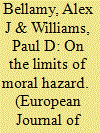

|
|
|
|
|
| Publication |
2012.
|
| Summary/Abstract |
Advocates of moral hazard theory argue that the 'responsibility to protect' causes genocidal violence that would not otherwise occur. After summarizing the main elements of the moral hazard approach, this article demonstrates that there is no empirical evidence to support the general claim that the 'responsibility to protect' is a remote cause of genocide. This is followed by an analysis of the conflicts in Bosnia, Kosovo and Darfur which demonstrates that moral hazard does not provide a plausible account of the proximate causes of genocidal violence in these cases. We suggest that a major part of the explanation for why moral hazard theory performs so badly is its reductionist account of the dynamics of armed conflict and its simplistic understanding of the dynamics of provocation.
|
|
|
|
|
|
|
|
|
|
|
|
|
|
|
|
| 18 |
ID:
182766


|
|
|
|
|
| Summary/Abstract |
This paper considers a modified principal-agent environment, where principals can use personalized offers based on agents' reciprocity-related information. With such information, principals can either impose stronger financial incentives or try to “trigger” agents' positive reciprocity by offering a higher fixed rate. Theory suggests that principals who believe in agents' reciprocity would personalize offers so that reciprocal agents increase their effort beyond the self-regarding benchmark. Using a lab experiment, we test the behavior of principals and agents. Our experimental market witnesses significant wage personalization when reciprocity information is available. However, agents' effort levels and principals' payoffs are lower under wage personalization, compared with the sessions where principals cannot personalize offers. Our structural analysis shows that, under wage personalization, agents expect higher fixed wages and reciprocate higher wages less. Information about agents' individual reciprocity is more correlated with the expected wages, rather than the strength of reciprocity toward higher or lower wages. Principals grant higher fixed wages to workers with lower wage expectations, but because principals cannot personalize offers effectively according to the strength of reciprocity, the performance of wage personalization is limited.
|
|
|
|
|
|
|
|
|
|
|
|
|
|
|
|
| 19 |
ID:
177823


|
|
|
|
|
| Summary/Abstract |
This paper revisits moral hazard associated with military aid given to host countries to eliminate their resident terrorist groups. This conflict aid presents recipient countries with perverse incentives because the aid ends once resident groups are removed. In the case of US aid recipients, the longevity of resident terrorist groups rose dramatically. The current article improves on the empirics of the pioneering article by showing that the moral-hazard concerns extend to other major donors – the United Kingdom, France, and Germany. Additionally, military assistance given by a collective of countries to host countries greatly reduces the moral hazard but does not eliminate it. Moreover, policy alignment or affinity between a major donor and the host aid-recipient country does not generally augment resident terrorist groups’ survival, except marginally for the United States, when other sources of military aid are allowed. We introduce other empirical and conceptual innovations for analyzing military-aid-induced moral hazard.
|
|
|
|
|
|
|
|
|
|
|
|
|
|
|
|
| 20 |
ID:
187135
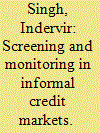

|
|
|
|
|
| Summary/Abstract |
The present article examines the screening and monitoring strategies used by lenders to solve the problem of imperfect information in the rural informal credit market. The study uses data from a primary survey conducted in Punjab, India. The survey focuses on informal lending between commission agents and farmers. Data were collected from 120 randomly selected commission agents from four blocks. Each of the blocks represents a different development level. The results show that commission agents invested significant time and resources for screening and monitoring the farmers. The screening and monitoring were found to be more stringent in areas that were underdeveloped and had higher default risk. Commission agents could shift a significant share of the screening cost to the borrowers, thereby increasing their self-enforcement range. The study argues that high screening cost hurts small farmers. The regression results found a significant reduction in the default rate and the unrecovered loan due to screening strategies.
|
|
|
|
|
|
|
|
|
|
|
|
|
|
|
|
|
|
|
|
|